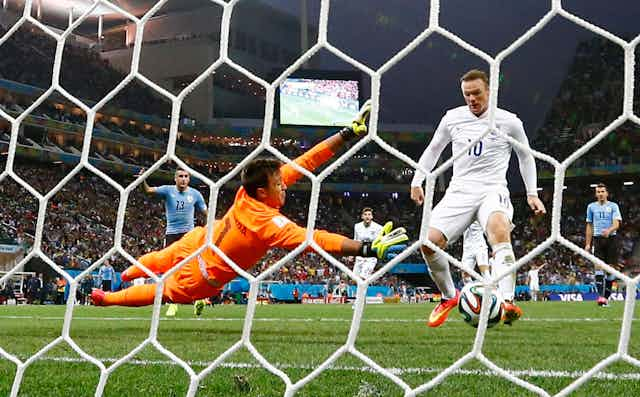David Cameron, the UK’s prime minister, has agreed the cornerstones of a deal that he hopes will see the British people vote to remain in the European Union. The vote will be held on June 23.
Most current opinion polls suggest that it will be a very close race. The Stay (in the EU) vote generally seems to be just ahead, but there are polls that say the contrary. Come what may, four months out and – to use a cliché – it’s still very much all to play for.
Given the tight contest, it is worth asking what might ultimately prove decisive in deciding the outcome. We know that referendum campaigns are important and that they can indeed have significant impacts on the eventual result. One perhaps unconventional part of that campaign might centre around how Wayne Rooney and the England football squad get on in this year’s European championships, which take place over a month from June 10. Bear with me – there’s a historical precedent here.
Harold Wilson’s bad World Cup
In 1970 Harold Wilson was all set to be returned to Downing Street in a June election. He had been consistently ahead in the polls and in the run up to polling day there was, despite a little bit of economic turbulence, confidence that the Conservatives under Ted Heath would be successfully defeated.

Yet Labour lost. The reasons for this were much debated at the time – but some of Wilson’s cabinet colleagues came up with the most leftfield explanation.
The 1970 election took place in the middle of the football World Cup in Mexico. England, as defending champions, appeared all set to do well. Alf Ramsey’s side came out of their group intact and ended up – as so often seems to be the case – locking horns with Germany. After looking as if they would win comfortably, leading the Germans 2-0 until the 69th minute, the old enemy clawed their way back and, heartbreakingly, won 3-2 after extra time.
So what? Well, the game took place just four days before the UK’s general election and the crushing nature of England’s defeat seemed to be of more broader significance to many than the result of a forthcoming election. Wilson himself noted that the national mood seemed to have changed after the game. According to his local government minister Tony Crosland, he put this down to: “The disgruntled Match of the Day millions”.

A small number of government supporters – so the hypothesis went – subsequently lost enthusiasm for Labour and didn’t vote, while others went from giving Labour the benefit of any doubt to having had enough of them. The numbers involved were, again so the theory goes, not particularly large – but they may have been large enough to help give momentum to a late swing.
Feelgood factor
So how might the England football team’s performance in the 2016 European Championships play out in terms of the EU referendum? Researchers Mark Franklin, Cees van der Eijk and Michael Marsh, argue that referendums are “subject to a ‘lockstep’ phenomenon” where the actual outcome is “tied to the popularity of the government in power”. They go further, claiming that this remains so even when the subject of the referendum has little to do with the reasons for the government’s popularity – or lack of it.
So far, so good for Cameron. But could he expect a further boost in his government’s popularity from the England football team’s campaign in France this summer? There’s hard evidence to say that the answer just might be yes. Research from the United States on the impact of college football results shows that voters tend to reward the incumbent if the local team wins in the immediate run-up to a presidential election. And the effect is often statistically significant. Further research has illustrated that the outcome of college football games reveals (over 40 years, too) a striking correlation not just with the results of presidential elections, but also senate and gubernatorial ones.
But this isn’t all. In an award-winning conclusion to their special issue of West European Politics on referendums in Europe in 2004, Aleks Szczerbiak and Paul Taggart stress the importance of “cues provided by elites”, but add that one shouldn’t neglect the underlying trends of the population at large: “The outcomes of referendums are neither the exclusive preserve of masses or of elites.”
Could one of these cues be the feelgood factor prompted by a successful campaign for England in the European Championships?
Eyes on the goal
After a truly dismal 2014 World Cup campaign the England side appears to have been given a new lease of life by the selection of a new generation of players such as Dele Alli, Ross Barkley, John Stones and Jamie Vardy. And ten wins out of ten in the qualifying group (with 31 goals scored and just three conceded) is clear evidence that all need no longer be doom and gloom.
England, furthermore, have been drawn in a group (including Russia, Slovakia and Wales) from which they ought to qualify. Their final group game against Slovakia is on June 20, just three days before the proposed date of the referendum.
Cameron therefore needs to hope that Wayne Rooney and his teammates come to the party in France in the summer. If they don’t it could have much greater consequences than simply prompting another bout of soul searching about the national football team’s perennial lack of success.
This article was updated on February 20 to reflect moving events

